Feds arrest, charge CEO of Iowa-based brokerage firm that is missing $200M in customer funds
Posted Jul 13, 2012 03:19:46 PM.
This article is more than 5 years old.
IOWA CITY, Iowa – The chief executive officer of an Iowa-based brokerage firm admitted in a suicide note to carrying out an elaborate fraud scheme in which he embezzled more than $100 million from customers over nearly two decades, federal investigators said Friday.
FBI agents arrested Russell Wasendorf, Sr., 64, of Cedar Falls on Friday. Federal prosecutors unsealed a criminal complaint charging the CEO of Peregrine Financial Group, Inc., with making false statements to regulators and released documents detailing a wide-ranging fraud scheme that apparently fooled colleagues, customers and regulators for years.
Wasendorf had been hospitalized at University of Iowa Hospitals and Clinics after attempting suicide outside the company’s headquarters in Cedar Falls on Monday by hooking up a tube to his car’s tailpipe.
His company filed for bankruptcy on Tuesday, the same day federal regulators filed civil fraud charges alleging the firm falsely claimed a bank account contained more than $220 million when it actually had about $6 million. The money in that account belonged to customers, and was supposed to be kept separate from Peregrine’s own money.
Officials from another industry regulator, the Financial Industry Regulatory Authority, were on site at Peregrine’s Cedar Falls offices to examine the firm Friday. The agency regulates broker-dealers that buy and sell stocks. The losses apparently are centred in the part of Peregrine that sold commodity options and futures.
An affidavit by FBI agent William Langdon, made public with the criminal complaint, says authorities found Wasendorf unresponsive Monday in his vehicle, along with a suicide note and a signed statement in which he detailed his fraud over the past 20 years.
“Through a scheme of using false bank statements I have been able to embezzle millions of dollars from customer accounts at Peregrine Financial Group, Inc. The forgeries started nearly twenty years ago and have gone undetected until now. I was able to conceal my crime of forgery by being the sole individual with access to the US Bank accounts held by PFG,” he wrote in the note, according to court documents.
Wasendorf said that he altered and falsified bank statements and made forgeries of official letters and correspondence from banks, the affidavit says. He said he used computer software, scanners and printers to “make very convincing forgeries of nearly every document that came from the bank.”
“I could create forgeries very quickly so no one suspected that my forgeries were not the real thing that had just arrived in the mail,” he wrote.
He said he was able to use his authority at the firm as its founder and sole shareholder to conceal the fraud. He said he ordered bank statements be delivered directly to him unopened, that he was the only person with access to the firm’s online bank account, and he told the bank that he was the only company official they should call, according to the court documents.
Wasendorf said he was also able to fool regulators checking how much money his company had by opening a post office box in Cedar Falls in the name of U.S. Bank, which he put on the counterfeit bank statements he created. Auditors mailed confirmation forms to the false address, and he sent phoney documents back showing the accounts contained “the amount I needed to show.”
“When online Banking became prevalent, I learned how to falsify online bank statements and the regulators accepted them without question,” he added.
Wasendorf confirmed that he wrote the statement and that it was true during an interview with investigators Monday at the hospital in Iowa City, Langdon wrote, estimating “the amount of loss due to his fraud exceeded $100 million.”
FBI spokeswoman Sandy Breault said she could not comment on where Wasendorf was arrested. Assistant U.S. Attorney Peter Deegan said Wasendorf would appear in person in federal court in Cedar Rapids on Friday afternoon for an initial appearance, but declined further comment.
The criminal complaint alleges that Wasendorf made false statements to the U.S. Commodity Futures Trading Commission about the value of customer funds held by his company from 2010 until recently.
Deegan said he did not know whether Wasendorf has an attorney, and court records did not yet list one as of Friday afternoon. A phone message left at company headquarters wasn’t returned.
Wasendorf’s son, Russ Wasendorf, Jr., the company’s president and chief operating officer, also received a copy of the statement from his father admitting to the fraud at his office on Monday, the FBI affidavit said. He told authorities he checked his father’s claims by obtaining a bank statement that showed a balance of $6.3 million — an account that regulators were told had $221.7 million as of December.
___
AP reporter Daniel Wagner contributed to this report from Washington.










